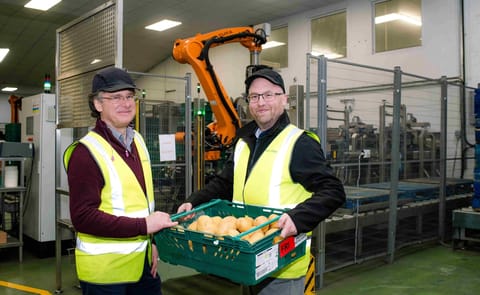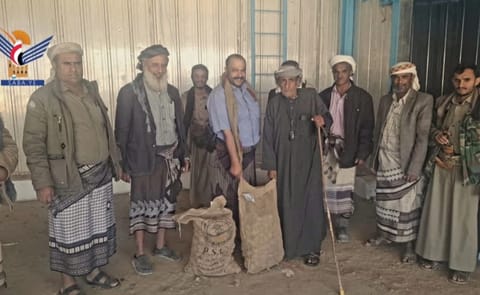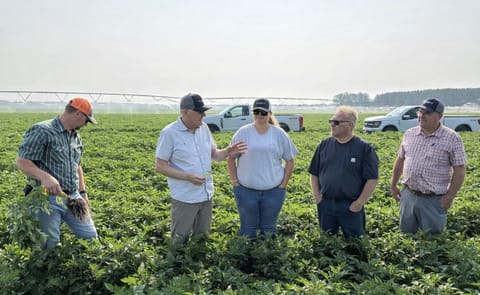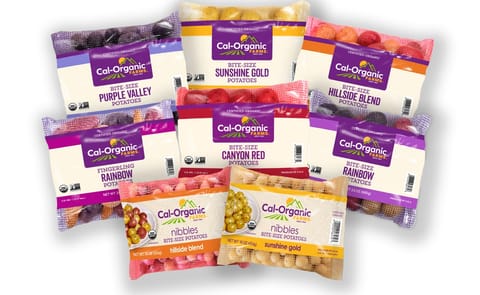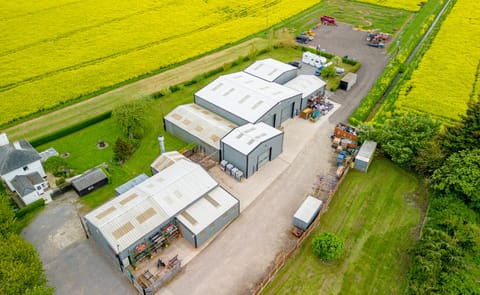Jan Hak presenting the new line of HAKING Harvesters and Tractors manufactured in the HakHandan Agro, Food & Technology Industrial Development in Hebei Province (Courtesy: Hak and Partners)
Solapas principales
Dutch agri-food expert Jan Hak sees great potential for potato production in China

With the help of Dutch technology and the Chinese people's own hard work, it is possible to double China's potato production as proposed in the current five-year plan, thus making potato a strategic bulk necessity for the Chinese population, said Jan Hak, a Dutch agri-food expert who has been engaged in Sino-Dutch agricultural cooperation in the past decades.
"China has set up a national strategy to make potato a staple food next to rice, wheat and corn. The Netherlands is leading in certain of these aspects. We could join hand in hand to reach a win-win situation," Hak, head of QuaTerNes, a Dutch leading company offering services, technologies and systems along integrated agri-food value chains, told Xinhua.
Earlier in October, his group signed a MoU with Xunyi, a remote county in China's central-west province of Shaanxi, to develop a project for multiplication of seed potatoes and a project for growing rootstock virus free.
Jan Hak:
"We are talking about an investment of 20 to 25 million euros. Next to our own capital, the financing will include leasing and some subventions from the local government and banks."
The projects add to a series of investments that Hak has done in China in recent years. In June, the ground-breaking ceremony was held for a Sino-Dutch HiTech Integrated Potato Chain Development Park in Qiqihar-Keshan, Heilongjiang Province in northeastern China.
The park is designed to host modern sustainable potato production facilities from breeding through cultivation, storage, and processing of over 300,000 ton into market ready innovative potato products, as well as an advanced agriculture machinery workshop for assembling and construction of systems for planting, cultivation, harvesting, storage, and handling of potatoes and other crops.
With their leading position in almost every aspect related to potatoes, the Dutch have been promoting new potato varieties and technologies in China since 1985.
Hak, at the time chairman of the sector association of manufacturers of machines for food processing, food packaging and "biobased systems" in the Netherlands (GMV), was among the first Dutchmen who tried to seed Dutch potatoes in China. His first personal experience with China was in 1985, leading a Dutch expert mission to Beijing.
In 1992, with the help of the Dutch government through a financing arrangement, GMV did the first demonstration of potato growing and processing in flakes in Hailar, northern China's Inner Mongolia Autonomous Region.
Jan Hak:
"In one year the company was running and it is still running. We modernized the starch factories in Kunming and we introduced the crisp, fried crisps, in Xiamen. That was slowly the beginning."
Later on, Hak also invested in other sectors such as honey, herbs and dehydration, goji berries, demonstration orchards and machinery.
"Not everything was successful," he admitted, "the nicest investment is that we are now producing harvesters in Handan, Hebei Province."
Hak is optimistic about the future of potatoes in China.
Jan Hak:
"Potato produces the highest result per mu (Chinese acre) with the lowest water consumption per food equivalent. Many Chinese provinces will be involved, especially in the so-called northern potato belt."
Also, "the potato chain modernization has been done here and there, little by little, in cultivation, processing, and storing, separately."
According to Hak, the next phase will be making new products adaptable to the Chinese market, as "not everybody needs to eat French fries".
"In Europe we do not eat noodles that much, but in China you have to look more in the direction of noodle products," he said.
With his 40 years of international experience, Hak also helped Bank of China with organizing match-making events for small-and-medium-sized enterprises in the Chinese and Dutch agri-food sector. During such an event in Rotterdam in July 2015, 196 intentions of cooperation were registered after 279 business meetings.
Hak also set up an investment fund registered both in Urumqi, capital of China's Xinjiang Uygur Autonomous Region, and in Shanghai.
Jan Hak:
"Projects to invest in will mainly be in the potato, fruits and vegetable industry. If we stick to potato and also strategic bulk goods in the agri-food sector, logistics and so on, it will be a successful fund."



